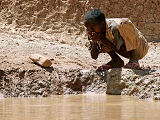Q&A: Africa climate change
Updated on 06 November 2006
The latest round of UN climate talks will focus on helping poorer countries adapt to climate change.

The new report from the United Nations Framework Convention on Climate Change (UNFCCC) describes measures to help African countries "climate-proof" their societies, economies and infrastructure.
What does the report say?
Scientists forecast that temperatures in Africa will increase by 2 to 6C by the next century.
The report states that rising sea levels could place 30 per cent of Africa's coastal settlements, including cities such as Cape Town, Lagos and Alexandria, at risk from flooding by 2080.
By then, more than a quarter of animal species' suitable habitats may have disappeared.
It also says rainfall patterns are shifting which may imperil wetland systems such as Botswana's Okavango delta.
How important is this for the continent?
Agriculture, the mainstay for a continent which relies heavily on cash crops, may also be devastated.
This is crucial as farming is the main source of income for nearly three in four Africans and accounts for 55 per cent of the continent's exports.
Cereal crop yields are predicted to drop by 5 per cent by 2080, while subsistence crops such as millet and maize will also experience decline.
What do they hope to achieve in Nairobi?
The 11-day Nairobi conference, which has drawn 6,000 delegates from 189 nations, will focus on establishing greater consensus in tackling global warming and seek ways to widen the UN's Kyoto Protocol on capping greenhouse gas emissions.
The UN Framework Convention on Climate Change was agreed in 1992, but its voluntary targets to cut emissions of greenhouses gases - especially carbon dioxide produced by burning fossil fuels and forests - were soon missed.
This is the 12th set of UN climate talks since 1992 but data just released shows greenhouse gases are still rising.
What is the Kyoto Protocol?
It was a deal that committed 36 of the world's most developed nations to legally-binding emission targets.
A total of 140 countries have ratified the Kyoto Convention, which itself grew out of the 1992 Rio Earth Summit, a watershed United Nations meeting.
The industrialised nations that signed up to the protocol committed themselves to a combined reduction in emissions to 5 per cent below 1990 levels by the period 2008 to 2012, although each country is set an individual target.
Japan, for example, will reduce its emissions by 5 per cent, the EU by 8 per cent and the UK government has declared its intention to cut greenhouse gasses by 10 per cent by 2010.
But the Kyoto Protocol is not exactly a panacea to the world's climate woes, is it?
No. One of the main shortcomings was the refusal of the US to ratify it and it is responsible for around a quarter of global emissions.
President George Bush unilaterally pulled out of Kyoto in early 2001, saying that the treaty was "fatally flawed" because it did not encompass developing countries, such as the growing economies of China and India.
China for instance, builds a coal-fired station every 10 days to fuel its development.
Also, meteorologists and environmental campaigners say the original target of a 5 per cent reduction in emissions was hopelessly inadequate to begin with, with something nearer 60% needed.
The World Meteorological Organisation (WMO) said carbon dioxide concentrations rose by half a percent during 2005, and will not start falling unless a stronger agreement than the Kyoto Protocol materialises.
Climate change is hot on the agenda, right?
British economist Nicholas Stern released a report last week that said poorer countries would be disproportionately affected by climate change, and measures to combat it could cost up 20 per cent of world GDP by 2050.
What kind of ways are they looking to 'climate proof' Africa?
They are looking at sea and river defences; boosting water supply infrastructure for drought-prone regions; planting of natural defences such as trees and mangroves; development of new crop strains resistant to higher temperatures or drought public education on issues such as saving water.


